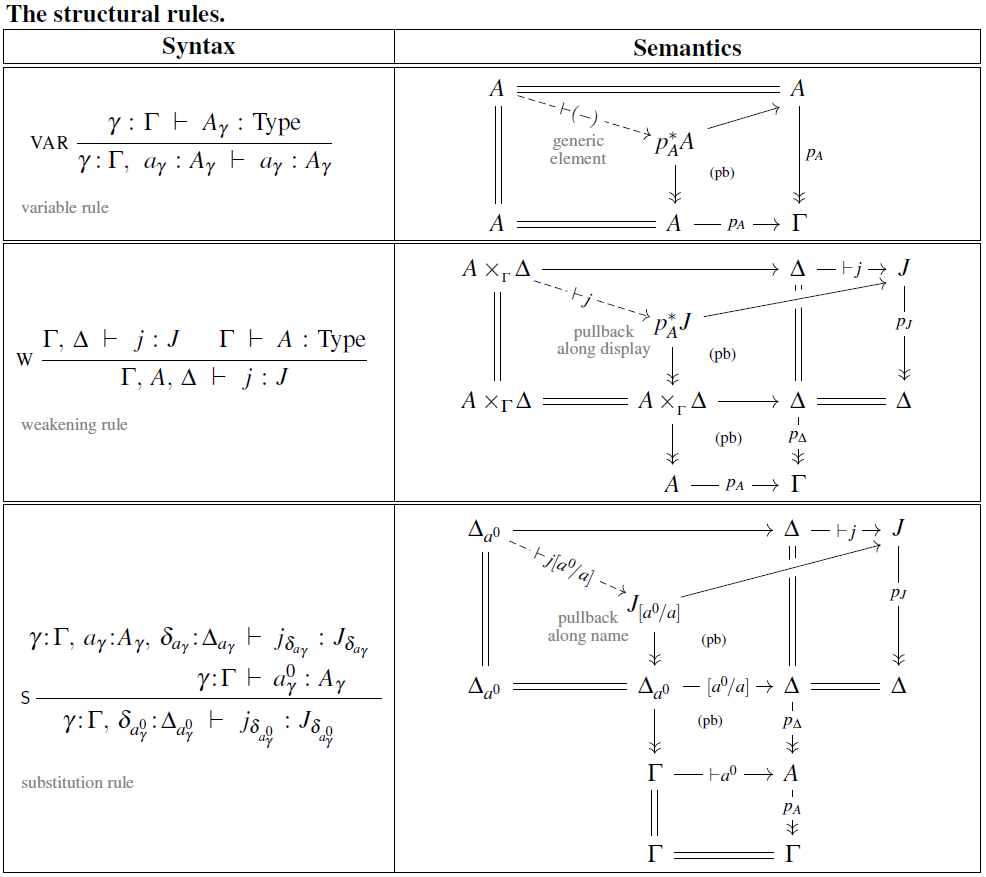nLab weakening rule
Context
Type theory
natural deduction metalanguage, practical foundations
type theory (dependent, intensional, observational type theory, homotopy type theory)
computational trinitarianism =
propositions as types +programs as proofs +relation type theory/category theory
The weakening rule
Idea
In formal logic and type theory, by “weakening rules” one means inference rules for context extension, which state that any premises may be added to the hypotheses (antecedents) of a valid judgement.
Along with the variable rule, the contraction rule and the exchange rule, the weakening rule is one of the most commonly adopted structural rules. But the weakening rule is not used in all logical frameworks, for instance in linear logic it is discarded.
Concretely, in intuitionistic dependent type theory the weakening rule is the inference rule
As usual in dependent type theory, the meaning of this rule is a little less trivial than it may superficially seem, due to the generic type dependency involved: In extending the contents in the antecedent we are implicitly making the succedent depend on this extended context, albeit trivially.
Accordingly, in the categorical semantics of dependent types the weakening rule corresponds to pullback of bundles/display maps to the fiber product which interprets the extended context:

Semantics
Weakening rules correspond to having projections for the monoidal structure that corresponds to the logical binary operator at hand.
Related concepts
References
The notion of weakening as a structural inference rule originates (under the German name Verdünnung) with:
-
Gerhard Gentzen, §1.2.1 in: Untersuchungen über das logische Schließen I Mathematische Zeitschrift 39 1 (1935) [doi:10.1007/BF01201353]
-
Gerhard Gentzen, §1.21 in: Investigations into Logical Deduction, in M. E. Szabo (ed.), The Collected Papers of Gerhard Gentzen, Studies in Logic and the Foundations of Mathematics 55, Springer (1969) 68-131 [ISBN:978-0-444-53419-4, pdf]
On the categorical semantics
- Bart Jacobs, Semantics of weakening and contraction, Annals of Pure and Applied Logic 69 1 (1994) 73-106 [doi:10.1016/0168-0072(94)90020-5]
Discussion in intuitionistic dependent type theory:
-
Bart Jacobs, p. 122, 585 in: Categorical Logic and Type Theory, Studies in Logic and the Foundations of Mathematics 141, Elsevier (1998) [ISBN:978-0-444-50170-7, pdf]
(emphasis on the categorical model of dependent types)
-
Univalent Foundations Project, §A of Homotopy Type Theory – Univalent Foundations of Mathematics (2013) [web, pdf]
(in the context of homotopy type theory)
-
Egbert Rijke, Dependent type theory [pdf], Lecture 1 in: Introduction to Homotopy Type Theory, lecture notes, CMU (2018) [pdf, pdf, webpage]
(in the context of homotopy type theory)
Last revised on August 25, 2023 at 15:08:55. See the history of this page for a list of all contributions to it.